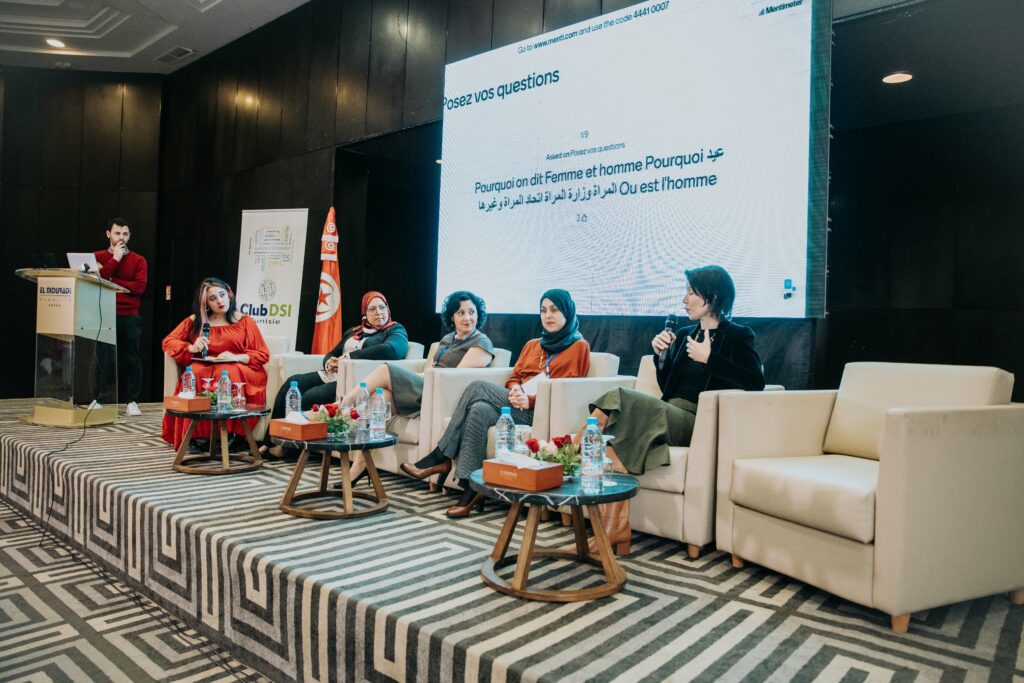
Report:
EMA e.V. is honored to have contributed to the first joint activity between the Club DSI and the AFTI thus working towards the consolidation of their new partnership through the co-organization of a training day for over 60 female and male IT professionals in Tunisia to equip them with additional professional skills under the theme “Women, key resource for a digital economy”, on Tuesday, March 23, 2022 in Tunis Gammarth.
The theme chosen for this edition is based on two essential observations: Female under-representation in leadership positions in digital fields in general, and the existence of genderprejudices and biases within the IT professions, which leads to the implicit renewal of gender inequalities.
The Intenside Training day was opened by the two Tunisian associations’ presentations followed by the EMA presentation of its structure and the Project “Cross-sector digitisation in Tunisia” under the Invest for Jobs special Initiative, funded by the German Federal Ministry for Economic Cooperation and Development (BMZ) via sequa gGmbH.
During her Keynote Speech, Ms. Nadine Nembach, co-chair of the European Women Management Development Network, pointed out to the existing glass ceiling for women worldwide. She sees that despite significant improvements in women’s educational achievement and independence and basic parallels, there is still a gender imbalance and unconscious bias in the IT sector.
This first presentation was followed by four intense workshops lead in parallel by four IT experts.
The first workshop titled: The Training of Engineers in Tunisia and the Drain of Talent: Impact on Women IT, lead by Ms. Nadia Lamloum, member of the association ATFI and Agile Coach.
Ms. Lamloum began her workshop with a rather striking figure: Every year, 2500 engineers leave Tunisia (source Ordre des Ingénieurs Tunisiens OIT). European countries and Canada have the greatest need for computer engineers.
While interacting with the participants in the room, the reasons for this brain drain were discussed. And among the reasons that were cited, we talked about the salaries of engineers in other countries which are more attractive, ranging between 2 500 and 3 000 euros per month, in addition to a remuneration in stable currency, given the depreciation of the dinar.
Ms. Ines Cheniour, CEO of COMMIT Consulting, has furnished the second workshop.
With the participants, Ms. Cheniour discussed the Opportunities of Digital Transformation for Women in IT.
First of all, the group talked about the challenges faced by women in the digital sector and the possibilities to foster their participation as well as to listen to the views and experiences of the participants on:
- The issue of gender in the digital sector
- Their vision for the future of leadership
- What constitutes good leadership in the digital world.
Ms. Cheniour emphasized that women should dare to put forward their talents and skills in order to reach management positions. “We are all facing the same problem. I firmly believe it’s a generational issue. The next generation of leaders will be much more sensitive to diversity and that is why it’s important to have corporate diversity programs to promote the representation of women starting today” she added.
The third workshop titled “Challenges of Women in IT to Impose Themselves in Positions of Responsibility (CIO, CISO, CDO, etc..)” presented by Ms. Aida Mejri, member of Club DSI and CIO of the Lilas group.
Despite the high percentage of girls and women in IT engineering schools, Ms. Mejri notes a discrepancy between graduation and employment: the share of women among the employed is 26.5% in Tunisia, 26.1% in Morocco and 18.3% in Algeria.
For decision-making positions, Tunisian women hold only 2% of these positions. And paradoxically four Tunisian women are in the top 50 leaders in cybersecurity in Africa.
Going back to the causes of this discrepancy, Ms. Aida Mejri, classifies them in 2 categories:
- Individual causes: Women would simply lose interest and motivation in these matters, as they progress in their careers which might be linked to the second category.
- Social causes: The feeling of physical and intellectual non-availability of women by managers.
Social, managerial and cultural norms influence women’s perception of their abilities and roles in society and their professional aspirations.
This third workshop, and through the opinions of the participants, shows that while younger generations are changing the game, the field remains largely male dominated.
Looking at this future where the new generation is trying to change the reality, Ms. Ines Bouharb, Executive Director of Excellia Human Capital, moderated the fourth roundtable entitled: “The IT Woman Facing Innovation and Future Jobs.“
Ms. Bouharb referred to a CNRS research conducted in 2007 on “The feminization of the engineering profession in Tunisia: scope and significance”, this study shows a glaring inequality in career and access to positions of responsibility.
Several reasons are at the origin of this inequality:
Gender bias: The main reasons for this low proportion of women in ICT jobs are mainly due to gender stereotypes. This primarily concerns the unequal sharing of time between men and women for childcare and other family tasks as well as differences in affinity for technology. The study makes a number of interesting findings: women in ICT occupations between the ages of 30 and 39 are less likely to have children, and in the 18 to 35 age group they are significantly more likely to be single and childless.
The ICT sector association Bitkom has pointed out that one of the factors that prevent women from choosing ICT professions is the long working hours (Bitkom 2019)
Cultural stereotypes:
The culture of leaving jobs considered difficult or technical to boys/men and directing girls/women towards jobs that are supportive or more adequate to the family balance (in terms of its different roles other than professional) has greatly contributed to creating a limiting culture among young female students or graduates.
Access to jobs and networking:
Juggling multiple roles and tasks, women are less effective at entering and maintaining their professional networks. We know that the hidden market, the off-the-shelf opportunities, represents more than 85% of the opportunities. This goes beyond 90% for senior positions. Young male engineers benefit from a “professional network” effect in accessing private employment, whereas young women value official channels (competitions, advertisements or friendly and family ties).
Resolutions:
At the end of this day, potential solutions and suggestions were proposed, on which the DSI Club and the ATFI association will jointly work on it. Among these recommendations, we can mention:
Changing the mindset from one of exclusion to one of inclusion:
Looking at inclusion from the perspective of the Space dimension means making sure that each person or group feels comfortable in the training environment and can project themselves into a training-related career field.
Improving women’s skills and confidence:
Development is linked to self-confidence and self-efficacy, both of which are essential to learning and skill development. It’s about ensuring that women are encouraged to pursue careers in the digital sector and are comfortable in a technology environment.
Creating Networks:
This is about creating the opportunity to positively integrate into the relational network of a group. This implies that women in a technical environment could feel accepted and recognized for their skills, beyond gender categorization. However, this recognition is not always achieved.
Women need to be empowered:
Empowerment is both a method and an outcome. It is the ability to set one’s own goals and act freely, but it is also the exercise of that ability that builds control over one’s own decisions as well as the potential to influence the decisions of others. It is the growth of social capital, which is a personal resource in interpersonal relationships (reputation, credit, influence).

